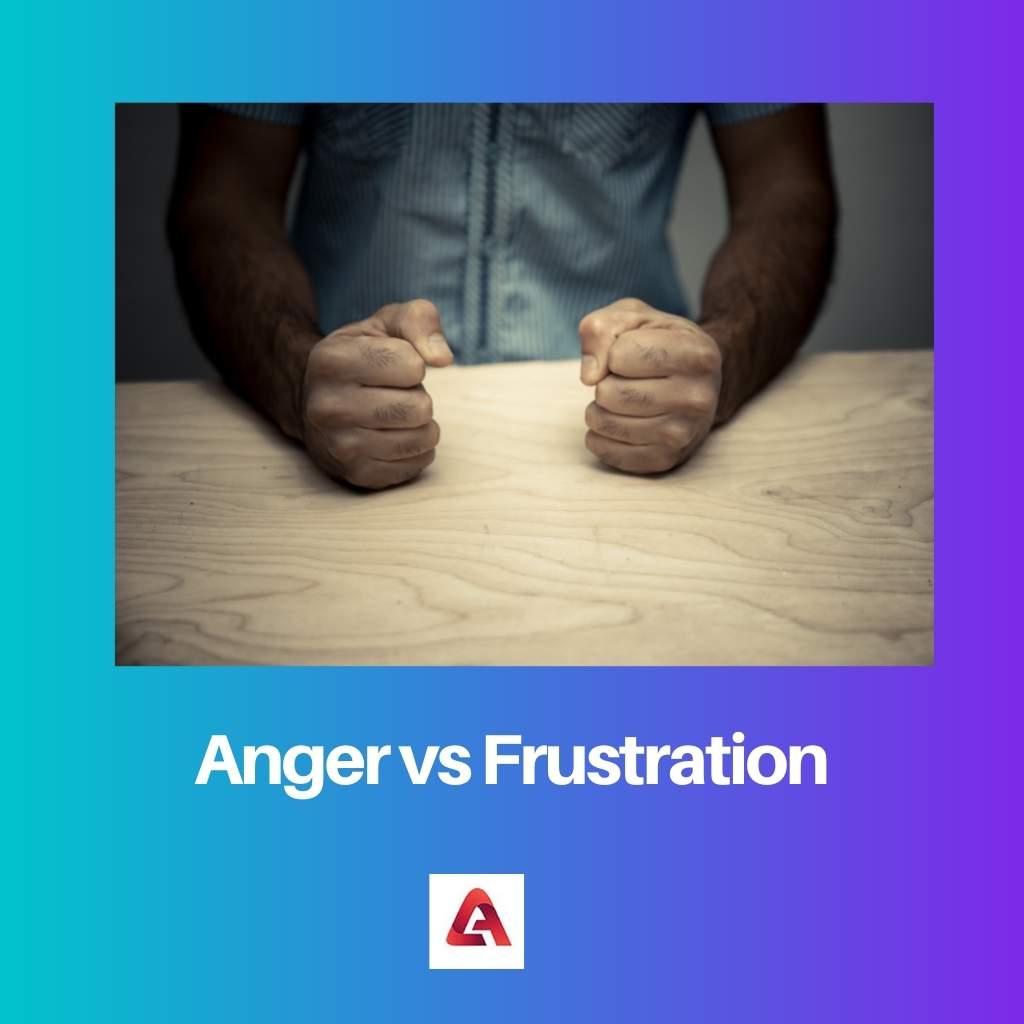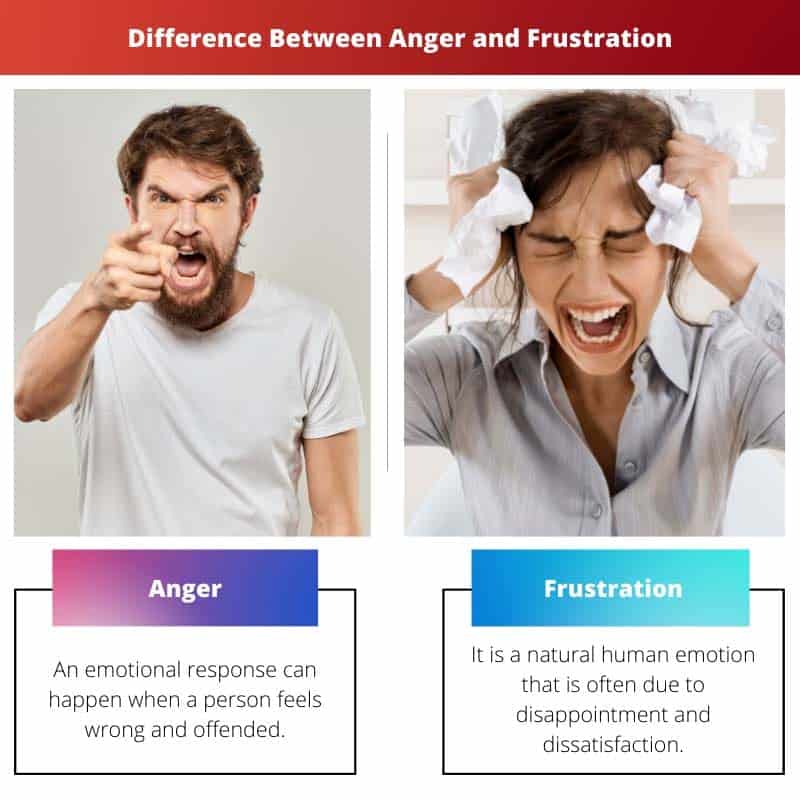Many times it happens when somebody is frustrated but is referred to as Angry. Well, Anger and Frustration both have the same symptoms, but Anger is a result of slow and steady Frustration.
Frustration and Anger are both human emotional responses to a certain situation which can be very hurtful and anxious.
Key Takeaways
- Anger arises from perceived injustice or mistreatment and involves a strong emotional response, while frustration results from unmet expectations or goals and may not involve an external target.
- Anger can lead to aggressive behavior and physical manifestations, such as increased heart rate or muscle tension, whereas frustration can result in feelings of disappointment and helplessness.
- Effective anger management techniques include deep breathing, mindfulness, and communication while overcoming frustration involves adjusting expectations, problem-solving, and seeking support.
Anger vs Frustration
Anger is a more explosive emotion that cannot be expressed verbally or physically, while frustration is a quiet emotion that builds inside and doesn’t show outside. Anger is a quick and aggressive response, whereas frustration is a slow and steady response. Frustration can lead to anger.

Anger is a normal feeling, just like happiness and sadness. Everyone experiences anger at some point in time. Anger is due to many reasons, such as pain, humiliation, injustice, and many more.
It is easily identifiable and visible to others. It is a quick and aggressive human feeling. It is mainly a response towards an external condition.
Frustration is an emotional response that cannot be visible in a person. It can be from inside or from external.
It is a slow and steady feeling that is build-up due to several factors, such as disappointment and dissatisfaction with certain things or situations.
It can be difficult to detect from a person’s body language because it can be hidden, and a person may seem fine.
Comparison Table
| Parameters of Comparison | Anger | Frustration |
|---|---|---|
| Definition | An emotional response can happen when a person feels wrong and offended. | It is a natural human emotion that is due to disappointment and dissatisfaction. |
| Nature | It can be due to frustration, and it’s quick and aggressive. | It is due to dissatisfaction or disappointment and mainly it is slow and steady. |
| Effect | It can cause insomnia, headache, heavy heart rate, high blood pressure, heavy breathing, etc. | There comes a feeling of hopelessness, discouragement, low self-esteem, loneliness, silence, etc. |
| Symptoms | It can be shown verbally and physically. A person can hurt somebody, or hurt himself or herself. | The symptoms are when one becomes aggressive in behavior, wants to be in a peaceful space, etc. |
| Visbility | It is a result of a build-up of frustration and can be shown verbally and physically. | Frustration is a build-up inside and it is not shown outside. |
What is Anger?
Anger is the emotional response to frustration. When a person is frustrated with himself or herself because of some situation, there comes the point that he becomes aggressive and then he becomes angry.
When you are in danger, it will likely have a response, whether verbal or physical.
Anger is a very quick and sudden response to anything when a person gets upset or dislikes a certain thing. Anger is mainly a response to an external thing or situation.
It is visible and identifiable. There are two types of Anger- Aggressive anger and Passive anger. The intensity of anger, and the time it could last, all depends on person to person.
Active anger can easily be observed, whereas Passive anger is like behaving the opposite, which is not expected. An angry person can suffer from insomnia, heart attack, heavy breathing, high blood pressure, etc.
Anger is not under control, and a person can have an outburst of anger. Well, anger can have both constructive and destructive sides.
If you get angry for something wrong and you get motivated to do something about it, then it is positive. But when something is making you angry just because of some silly thing or in a defensive way, it will have negative results.

What is Frustration?
Frustration is also a human emotional response when a person gets very disappointed in a certain situation or dissatisfied with themselves or other things or situations.
This frustration can be caused by several things, such as internal sources and external sources. Internal sources include a lack of self-esteem and self-confidence.
Sometimes our efforts can go to waste, and we can sabotage ourselves, which also leads to frustration.
External sources include certain things or work that is blocked by some obstacles which don’t expect to happen, which causes frustration. When there is a waste of time that we don’t want, that can be an example of an external source.
The response of frustration can be of different types, such as anger, stress, feeling sad, engaging in self-destructive things, giving up, or quitting.
Again Frustration is also something that can be used positively and can be a reason for motivation. Using it differently can be positive for us.

Main Differences Between Anger and Frustration
- Anger is a quick and aggressive response, whereas Frustration is a slow and steady response.
- Anger is mainly due to external sources, whereas frustration can happen within ourselves and also from external sources.
- Anger is a response to a build-up of frustration, whereas frustration is a feeling developed slowly in response to certain disappointments.
- Anger can be easily identifiable and visible, whereas frustration is not detectable and visible.
- Anger can cause heart attack, high blood pressure, heavy heart, etc., whereas Frustration can cause low confidence, lack of energy, low-self esteem, etc.

- https://www.sciencedirect.com/science/article/pii/B9780123725455500162
- https://link.springer.com/article/10.1007/s11199-006-9131-y
Last Updated : 09 August, 2023


Emma Smith holds an MA degree in English from Irvine Valley College. She has been a Journalist since 2002, writing articles on the English language, Sports, and Law. Read more about me on her bio page.

The comparison table provides a comprehensive overview of the differences between anger and frustration. Recognizing and addressing these emotions are important for personal growth and resilience.
I completely agree. The insights provided in the article can be beneficial for self-reflection and emotional regulation.
The comparison of anger and frustration, along with the description of their symptoms and effects, offers valuable knowledge for emotional self-regulation. This is a thought-provoking and informative read.
Absolutely, the depth of understanding provided in the article can contribute to better emotional intelligence and self-management.
The article explains the distinction between anger and frustration in a very clear and concise manner. It’s valuable to understand these emotions and their impact on our mental and physical health.
Absolutely, recognizing anger and frustration and learning to manage them is essential for mental well-being.
The comparisons between anger and frustration, and the description of their nature and effects, contribute to a deeper understanding of our emotional responses. This article is intellectually enriching and thought-provoking.
Absolutely, this article provides an intellectual discussion on anger and frustration, which can be beneficial for self-awareness and emotional regulation.
These are very helpful and enlightening tips on understanding the differences between anger and frustration. It’s crucial to recognize the symptoms and effects of these emotions for better self-control and emotional intelligence.
I couldn’t agree more. This is a well-thought-out comparison and it’s important to have the tools to manage these emotions effectively.
The detailed explanation of anger and frustration, along with their consequences, provides valuable insights into our emotional responses. This article is intellectually stimulating and enlightening.
I couldn’t agree more. Understanding these emotions can lead to better emotional well-being and interpersonal relationships.
This article offers a detailed analysis of the differences between anger and frustration, and the potential consequences of these emotions. It’s enlightening and beneficial for self-awareness.
I wholeheartedly agree. The article provides key insights into understanding and dealing with anger and frustration constructively.
Understanding the impact of anger and frustration on our physical and emotional well-being is crucial. The distinction between these emotions is well-explained and insightful.
I couldn’t have said it better. This article provides valuable information that can promote better understanding and management of emotions.
This in-depth analysis of anger and frustration is insightful and educational. It’s essential to be aware of how these emotions manifest and how to manage them for personal growth and well-being.
Indeed, the article offers valuable knowledge that can aid in understanding and coping with anger and frustration effectively.
The article’s definition of anger and frustration, accompanied by the comparison table, is intellectually stimulating. It equips readers with the understanding needed for emotional intelligence and self-care.
I completely agree. This article is informative and provides practical insights for managing emotions and promoting well-being.